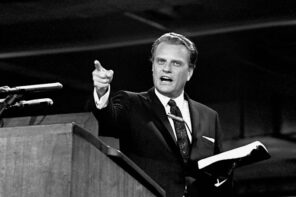New data released by the Pew Research Center has pundits once again running with the unhelpful narrative that America’s conservative, mostly white evangelicals comprise an essentially “political” (as opposed to “religious”) identity and movement—the not-so-subtle subtext being that “real” evangelicals pose no threat to democracy and human rights. In a nutshell, what Pew found, using data from the same group of people polled after both the 2016 and the 2020 elections, is a net four percent increase in white Americans who identified as born again or evangelical over that time period, with the increase apparently driven by favorable attitudes toward Donald Trump.
That’s an interesting finding, but it simply doesn’t sustain the conclusion that “evangelicals have exchanged religion for power,” as one writer summarized Charles M. Blow’s commentary on the data. For the vast majority of white evangelicals, attempting to acquire or maintain the power to enforce what they believe to be God’s will in the public square is a religious imperative, one that’s not contradicted by their support for former President Donald Trump.
After all, he did more to promote their agenda than any previous president, including George W. Bush, not least by stacking the federal courts and the Supreme Court with right-wing Christian extremists. This transactionalism and hardball maneuvering is, to be sure, political—but that doesn’t make it any less religious. What Blow sees as evangelicals giving up morality for power is hypocritical to be sure—evangelicals decried “sexual immorality” in the case of former President Bill Clinton, when it suited them, but gave Trump a pass for far worse offenses. At a deeper level, though, this ugliness is evangelical morality—a morality based on social hierarchy and obedience.
I’ll admit I was initially nonplussed, and even a little upset, at the new Pew findings. As an exvangelical and the creator of the hashtag #EmptyThePews, I had wanted to see a large-scale exodus from white evangelical (and similarly authoritarian) churches during the Trump years. But when I took a step back to consider the context for these findings, I realized they’re not really all that earth-shattering.
To be sure, I’m forced to admit that the Trump years themselves were not characterized by a large proportion of evangelicals leaving their pro-Trump churches in protest. Nevertheless, it was precisely in those years that exvangelicals came together and created a movement that’s only growing in visibility. Evangelicals have found it impossible to ignore our movement, even though they generally refuse to engage with exvies directly, preferring to talk about us rather than to us in their unsuccessful attempts to maintain control of the narrative.
In addition, large numbers of youth (and not a few older adults) clearly have “emptied the pews” of white evangelical churches in recent decades, even if we don’t know exactly how many, since data on exvangelicals is in scant supply. What we do know is that white evangelicals have declined precipitously as a percentage of the American population in recent years, down from about 23% in 2006 to about 14% at present (though they continue to vote in greater numbers than the general population, giving them disproportionate representation in elections). And in the 2020 election, nonreligious voters, a strongly progressive-leaning demographic, made up a full quarter of the electorate, for the first time outnumbering white evangelical voters who made up 19% of the electorate.
It’s hard to know exactly how to square the Pew data suggesting that some Americans have recently begun identifying as evangelical or born-again with these findings showing overall demographic decline, not to mention the consistent findings throughout the Trump era that, among white evangelicals, frequent church attendance was closely correlated with higher support for Trump. That correlation, which should be foundational to any discussion of white evangelical religion and politics, definitively refutes any suggestion that pro-Trump evangelicals are mere “nominal” Christians—unless of course you want to argue that evangelical churches themselves aren’t “really” evangelical.
Even #NeverTrump Republican pundit and consummate “respectable” evangelical David French is forced to concede that there isn’t “a stark difference politically between church-attending white Evangelicals and those who never darken [church] doors” in his blog post on the Pew data. And yet he goes on to put forth the contradictory assertion that “theologically evangelical” (i.e., “real” evangelical) Americans represent such a small proportion of white evangelicals overall—“a minority of a minority,” he laments—that they “don’t exercise decisive political power.” The evangelicals who don’t fit into this elite minority are the ones, he asserts, who don’t know their Bible, which is why “Evangelical political action can be so cruel and often so disconnected from biblical ethics.” Never mind that French supports some of that cruel action, particularly when it comes to LGBTQ rights.
In any case, it should hardly need pointing out that the same elite evangelical culture warriors who drive evangelical political action have evangelical institutional pedigrees. They were often homeschooled or attended evangelical schools and/or colleges where they memorized passages from the Bible and read evangelical theology. They attend doctrinally evangelical churches. And now they’re lobbying Congress, like Liberty Counsel’s Mat Staver, a former pastor and former dean of Liberty University’s law school; or they hold congressional office, like North Carolina Representative Madison Cawthorn, who was homeschooled and briefly attended Patrick Henry College; and Illinois Representative Mary Miller, a Sunday school teacher at Oakland Christian Church who became infamous for saying out loud that “Hitler was right” about the importance of indoctrinating the youth.
But if the Pew findings aren’t telling us that the theological “purity” of white evangelicalism has been diluted with an influx of “nominal” Christians, a process French maintains took place over decades and culminated with Trump, then what exactly are they telling us? The truth is, not much. Without more granular data, we can only engage in (hopefully informed and plausible) speculation about the forces behind the numbers.
Who are these white Trump voters who eschewed the “born again” label in 2016 but had adopted it by 2020? I would guess they skew older, and thus hardly represent the wave of the future; but whether or not I’m correct about that, they’re people who saw white evangelical churches, quite correctly, as Trump-friendly, and so decided to identify as that kind of Christian, which is hardly a win for the “real” evangelicals.
Beyond that, who knows exactly what’s going on with the current rounds of label-shuffling among American Christians? To really answer that question, we’ll have to wait and see how things shake out, but there’s nothing unusual about the phenomenon itself. Rebranding is a constant of American religious life and not limited to evangelicals, but evangelicals do exhibit a pattern of being very conscious about their brand. That’s why some of them have attempted to drop the evangelical label in recent years, and numerous Baptist churches have dropped their affiliation from their names in recent decades because of widespread negative associations with the term “Baptist.”
Let’s be clear. The evangelical embrace of Trump does represent the culmination of a decades-long process in which white evangelical subculture merged with the Republican Party—but this doesn’t mean, as French claims, that “the transformation is political and not religious.” For me, growing up socialized in evangelical churches and Christian schools, it was always simply taken for granted that being a Christian meant reading the Bible daily; attending church often; praying before meals, before any significant event and before bed; fighting the culture wars; and (when old enough) voting Republican.
Our right-wing political extremism was a part of our religious identity, completely inextricable from our devotion to the four principles of French’s beloved Bebbington Quadrilateral: biblicism, crucicentrism, activism, and conversionism. We cultivated knowledge of the Bible—interpreted in an authoritarian manner, of course.
This clearly remains the case for a large proportion of Trump’s evangelical supporters, even if some portion of evangelicals may not be very familiar with the Bible. The notion that there’s a clear line where religion ends and politics begins is a fiction—one exploited far too easily by people who want to save “pure” Christianity from human ugliness. With American democracy (such as it is) in crisis precisely because right-wing Christians have taken disproportionate power, we can’t afford to keep letting pundits get away with this Christian supremacist sleight-of-hand.





